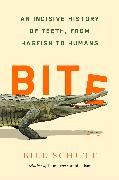- Start
- Bite
Bite
Angebote / Angebote:
A longtime research associate in zoology at the American Museum of Natural History and author of Cannibalism and Pump, Bill Schutt turns his expertise to teeth, taking readers on a fascinating and sometimes creepy journey through their natural, scientific, and cultural history, arguing that tooth evolution has been the most important factor to vertebrate species' success. In Bite, Bill Schutt makes a surprising case: It is teeth that are responsible for the long-term success of vertebrates, those creatures who have a backbone, including fish, amphibians, reptiles, birds, dinosaurs, mammals--and us. An vertebrate zoologist, Schutt knows a thing or two about evolution and he tells this tale of teeth and their importance with his usual combination of hard science, fascinating trivia, and his signature witty delivery. The appearance of teeth, roughly half a billion years ago, was an adaptation that allowed myriad forms of vertebrates to chow down in pretty much every conceivable environment--from sun-torched deserts to rainforests teeming with thousands of species of animals and plants. From an evolutionary standpoint, species with teeth could eat things that potential competitors couldn't. For example, Neanderthals and early modern humans used their teeth as tools, to soften tough fibers and animal hides, and vampire bats use their razor-sharp teeth to feed on a widespread but generally untappable resource: blood. And it's not just food--or blood. Teeth, which include tusks and fangs, played--and still play--a crucial role as defensive weapons. Glimpsing the upper canines of snarling dogs or baboons is all it takes to know that teeth are an efficient means of expressing strength, dominance, and aggression, while human teeth project information about social status and moral character. It's doubtful, for instance, that George Washington would have been elected if he didn't have false teeth. Bite is popular science at its best, filled not just with fun facts, but also with vital and illuminating context. As Schutt explains, so much of what we know about evolution on this planet has come from the study of fossilized teeth, which have provided information not only about ancient diets and health but, famine, war, disease, and starvation--which in turn might help us cure diseases like Alzheimer's and identify early-life stresses that can put individuals at risk for mental health problems.
Noch nicht erschienen, August 2024
